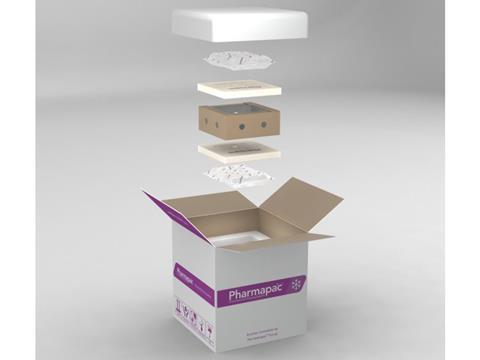
Hydropac is unveiling PharmaPac, a range of thermal packaging solutions designed to overcome ‘last mile’ delivery challenges and meet regulatory requirements for temperature-sensitive medications and vaccines.
PharmaPac intends to help products from the pharmaceutical and biotech sectors tackle issues in transportation, protecting the integrity of biological samples and laboratory products and making sure all products arrive at their destination in optimal condition.
PharmaPac Genesis consists of a polystyrene box, ice packs, a universal payload tray, and a thermal filter pack. As Hydropac’s first PQS/Validated ‘pre-qualified system’, it protects refrigerated payloads at temperatures of 2 – 8°C for at least two days.
Its polystyrene cool boxes are set to facilitate passive cooling strategies for delicate items like medications and vaccines, while the 750g ice packs are made with a combination of an advanced gel formula and purified, UV-treated water. Due to the high-grade film casing, they are said to offer both recyclability and puncture resistance.
“The need for reliable and efficient temperature-controlled packaging has become more important than ever, especially within the pharmaceutical and biotech industries,” explained Hydropac’s general manager, Stephen Fieldhouse. “The reality is, that a temperature deviation of just a degree or two whilst in transit across the globe, can have a serious impact on the quality, shelf life or even usability of vital medications and lab samples.”
“Our PharmaPac range aims to address these challenges by providing state-of-the-art solutions that ensure the integrity and stability of pharmaceutical products during every stage of transportation.
“With PharmaPac, we aim to provide a strategic asset in preserving the safe and efficient distribution of critical life-saving pharmaceutical products around the world.”
In a similar development, Peli BioThermal’s Crēdo Go – a reusable, flexible, temperature-controlled shipping solution – was revealed in late 2022. It was designed to help pharmaceutical companies reach environmental, social and governance goals, cost reduction targets, and operational performance indicators.
Additionally, Phononic’s Actively-Cooled Tote (ACT) 2000 cooling and freezing equipment for cold chain applications uses a proprietary thermoelectric-based cooling platform to combat toxic refrigerants and hydrofluorocarbons (HFCs) that contribute to global warming.
In e-commerce applications, Ranpak’s climaliner solution, RecyCold, was a finalist in the Sustainability Awards 2023. It is a recyclable, paper-based thermal liner designed for cold chain shipping applications in various sectors.
If you liked this article, you might also enjoy:
The L’Oréal approach to packaging sustainability
The way we talk about plastic needs to change – here’s how to get it right
What steps is Apple taking to make its packaging more sustainable?


















No comments yet